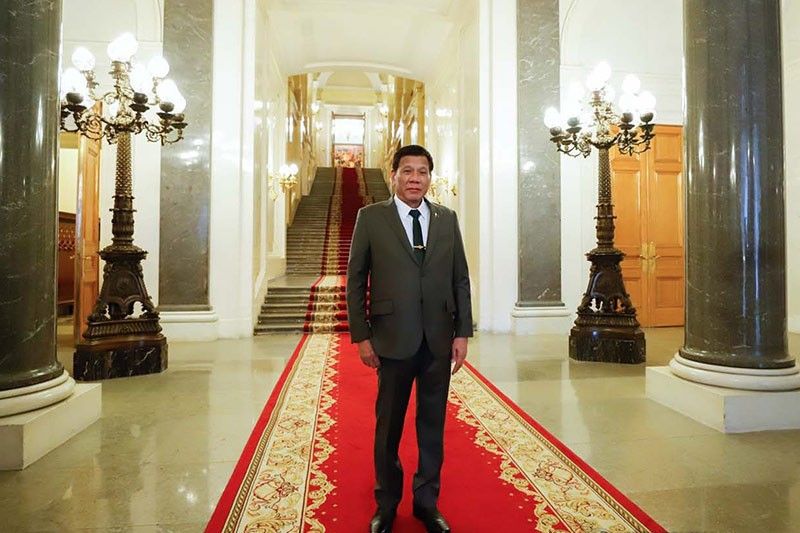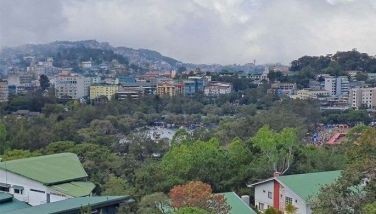Russia willing to help with nuclear energy, counter-terrorism should Philippines ask — envoy

MANILA, Philippines — Russian Ambassador to the Philippines Igor Khovaev said Moscow is ready to lend the Philippines assistance in exploring the possibility of nuclear energy should it tender a request.
"I would like to emphasize that it's up to you Filipinos to decide whether you'll use sophisticated nuclear technology or not,” he said Thursday in an interview with CNN Philippines where he highlighted the safety and sophistication accompanying their Russian technology.
“[W]e are ready to discuss any option of cooperation, we are ready to offer our sophisticated nuclear technologies, we are ready to help you build nuclear power plants, including the floating nuclear barges."
The ambassador gave assurance that nuclear facilities built by Moscow in some 30 countries are functioning with no reported incidents yet.
"By the way, [the] Chernobyl Power Station is located in Ukraine, not in Russia," he added.
Constitutionality concerns
Malacañang said the country’s “intention to jointly explore the prospects of cooperation in the construction of nuclear power plants" was among the business deals signed during President Rodrigo Duterte’s visit to Russia collectively worth $12.6 million.
In a related statement, Russian President Vladimir Putin said his country is interested in "promoting industrial cooperation and joint projects in the peaceful use of nuclear energy."
But according to Malacañang, a nuclear energy deal between the two states is still “uncertain” due to the issue of constitutionality.
Even the president himself has admitted that he has apprehensions toward the project as it would be against the 1987 Constitution, which declares in Article II Section 8 that the country “adopts and pursues a policy of freedom from nuclear weapons in its territory.”
“The Constitution would not like it. That is why I have to talk to the Cabinet. I cannot affirm or deny that because that's part of the proposals,” the president told reporters upon his return last October 6.
In a statement dated Nov. 12, 2000 at the Conference on Facilitating the Entry into Force of the Comprehensive Nuclear-Test-Ban Treaty, Filipino diplomat Enrique Manalo said, “From this basic policy emanates the following Philippine goals: maintaining a stable and peaceful international and regional environment; promoting the creation of a non-nuclear weapons world, and ensuring the country's protection from the threat or use of weapons of mass destruction by other countries.”
Duterte in a 2017 phone call with US President Donald Trump expressed fear over the presence of North Korean warheads in the region.
“As long as those rockets and warheads are in the hands of Kim Jong Un, we will never be safe as there’s no telling what will happen next,” the chief executive said.
Other possibilities
Of this particular front in the two countries’ cooperation, Khovaev said he believes a partnership should not strictly limit itself to only nuclear technology.
"Russia is an energy superpower so we are ready to supply energy resources to your country and to be a new reliable partner, a new reliable supplier of energy resources to your growing economy,” he said.
“It will help you increase the competitiveness of your economy."
Aside from energy, Moscow also offered to assist Manila in its fight against terrorism. At the start of their earlier meeting in early October, Putin reiterated to Duterte that Russia was prepared to provide assistance in countering terrorism as well, recalling that Duterte had once cut short his first trip to the country in 2017 amid the siege of Marawi City.
The five-month battle in Marawi left around 160 soldiers and 1,000 terrorists dead in its aftermath, with the initial wave of martial law declared immediately after the breakout of the siege.
The commander in chief’s 2019 midterm report said that although the Islamic center was successfully liberated in October, "the threat of other rebel and terror groups remained." For Malacañang, this justified the continued extensions of military rule on the island.
Today, exactly two years and a day after the end of the siege, the city, along with the rest of Mindanao, lies suspended in martial law after having been extended thrice from 2017 to December 2019. It is expected to remain that way until the end of the year.
"You can expect the help and assistance of any kind. We are ready to supply our sophisticated arms and weapons. We are ready to help you in staff training, we are ready to share our experience, we have quite rich experience how to fight terrorism," Khovaev said.
"We are ready to help your country to develop your own defense industry and we also share special specified info in this aspect," he added.
A foolish idea
A fisherfolk’s federation on October 9, however, cautioned the public against what they said was a “foolish” idea. Pamalakaya National Chairperson Fernando Hicap said the Philippines is vulnerable to earthquakes and typhoons, making nuclear energy impractical.
Citing a hazard map by the UN Office for the Coordination of Humanitarian Affairs, Pamalakaya said the country’s positioning on the Pacific Ring of Fire leaves it vulnerable to earthquakes "predominantly at Degree VII to XII of the modified Mercalli Scale on earthquake intensity."
"Dumi nga ng tao hindi na-secure ng MWSS at umabot pa sa Manila Bay, radioactive water pa,” Hicap, former Anakpawis party-list representative, said.
“Ibang bansa nga tulad ng Japan, namo-mroblema kung saan itatapon ang nakakalasong tubig mula sa Fukushima nuclear power plant, tayo pang wala ngang sariling industriya. Kaya tigilan na yang kalokohan na iyan."
(The Metropolitan Waterworks and Sewerage System cannot even secure human waste, which ends up in Manila Bay, what more radioactive water? Other countries like Japan are having problems on how to dispose of the poisonous water from the Fukushima nuclear power plant, what more a country like ours that does not have its own industries? So, forget that foolishness.)
Under the Mercalli scale, Intensity VII earthquakes are classified as "very strong" while XII earthquakes are "extreme."
"Mga malalakas na bagyo nga ay hindi pa nakaka-rekober ang mga mamamayan dahil inutil ang gubyerno sa rehabilitasyon, iyan pang nuclear-nuclear na iyan ang inaatupag nila,” Hicap said.
(The people have not even recovered from strong typhoons because the government is failing at rehabilitation, and they're looking at nuclear power instead.)
The Bataan Nuclear Power Plant, completed in the early 1980s, has never been commissioned due to fears raised by a nearby fault line, the project's integrity, and the 1979 Three Mile Island as well as the 1986 Chernobyl nuclear accidents.
'Us against the world'
Presidential spokesperson Salvador Panelo in a Facebook statement noted that the progress in Philippines-Russia relations came "after [Duterte] sought the rebalancing of traditional partnerships and the deepening of relations with non-traditional partners at the onset of his administration."
"[T]here are three of us against the world — China, Philippines and Russia. It's the only way," Duterte was quoted as saying in 2016 in China, marking a complete reversal in foreign policy since he took office.
Talks surrounding the prospect of nuclear energy are one of many diplomatic moves the two countries have made together as of late, with both countries being members of the Asia-Pacific Economic Cooperation.
"I invite all Filipinos, please go to Russia, discover my country," Khovaev said in the same interview. "My country is much, much different from those aggressive Russian guys, as portrayed in Hollywood movies.”
Besides their strides made in the fields of economic, security and space-research relations, further cooperation with Russian space agency Roscosmos is also expected after Manila recently signed into law the creation of a consolidated Philippine Space Agency.
Putin himself has affirmed the country’s ties with Manila, saying, “I would like to highlight that the Philippines is a very important partner of Russia in Asia.” Putin called their cooperation "constructive and mutually beneficial" during their meeting.
"We Russians and Filipinos have a lot in common. We have the conditions to be good friends and partners,” Khovaev ended.
- Latest
- Trending

































